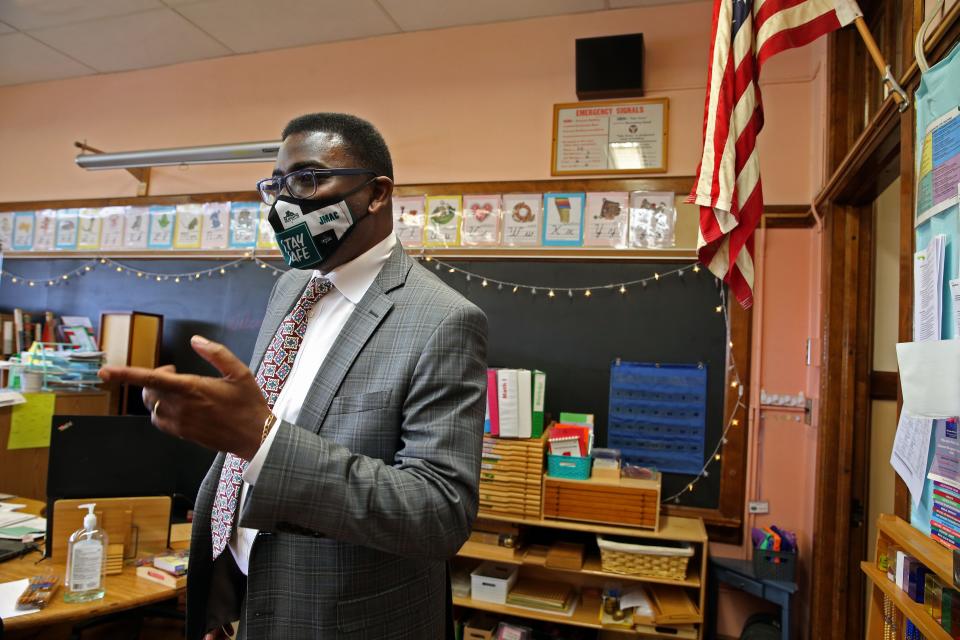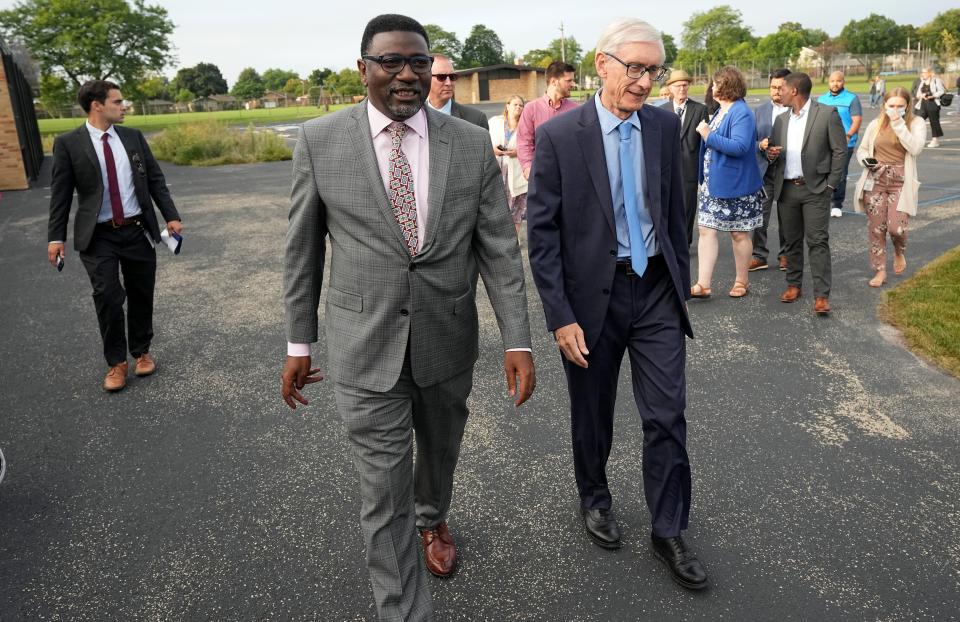After resignation, what is Superintendent Keith Posley's legacy at MPS?
Sitting feet away from the podium in the district’s board room Monday night, Milwaukee Superintendent Keith Posley calmly watched speaker after speaker call for him to be fired.
About eight hours after the meeting began, Posley reached for his microphone and announced his resignation with a grin – keeping a positive spin, to the very end, on grim matters at MPS.
"It has truly been an honor to serve Milwaukee's children for almost 35 years," said Posley, who has spent his career in the district.
He kept his comments short, with no hint of the pressure coming down on him. In the preceding days, Posley had received sharp letters from state and federal officials accusing the district of failing in basic financial operations and safety measures for its youngest students. He dodged reporters after the state's letter went public.
In his years as superintendent, Posley took countless opportunities to say he was "hashtag MPS proud." That seems likely to be a lasting sentiment, as he and the school board agreed in a separation agreement Tuesday not to disparage each other. Posley secured a $160,000 severance payment.
This chapter of Posley's legacy, which to some is already casting a shadow over his previous accomplishments, will crystallize as other officials piece together what went wrong.
Before resigning this week, Posley's legacy was already dynamic. He led the district through an unprecedented pandemic. He battled an attempt to break up the school district. He saw the district through two referendums to increase tax revenue while inflation mounted and student enrollment declined.
"He always had a positive attitude toward problems," Bob Peterson, who was on the Milwaukee School Board from 2019 to 2023 and served as president for the last half of his term, said Tuesday.
He added, regarding the recent revelations: "We all have shortcomings."
Before becoming superintendent, Posley worked his way up in MPS
Milwaukee School Board members gave Posley the superintendent position in 2018 with a unanimous vote. He had been serving as an interim superintendent after former superintendent Darienne Driver stepped down.
Since graduating from Tougaloo College in Mississippi, Posley had spent his career at MPS. Before becoming superintendent, he worked as a physical education teacher, a principal, and the district’s chief of school administration.
"Posley knew so many people on a first-name basis in the district," Peterson said. "People appreciated when he went into classrooms and schools. I could hardly keep up with him."

Posley led the district through the pandemic
Two years into Posley’s time on the job, Gov. Tony Evers closed schools across the state in March 2020 as the COVID-19 pandemic was declared a national emergency.
Posley helmed MPS through the pandemic, making contentious decisions with board members to keep schools closed until April 2021, require masks through the 2021-22 school year and set a vaccine mandate.
"We were in a situation that no matter what you did, people were critical," Peterson recalled. "There was no obvious correct path to solve all the problems with COVID."

Like in schools across the country, MPS students’ test scores haven’t recovered since the pandemic and gaps between demographic groups have grown.
Research has shown that Black families were more likely than white families to experience pandemic-related job loss, hunger and financial insecurity. Additionally, lower-income families were more likely to lose income. Those factors affected students, many of whom took on jobs, helped care for siblings, and reported worsening mental health challenges since the start of the pandemic.
Posley led MPS through two successful referendums
During Posley's time as superintendent, MPS has been dealt a litany of financial challenges.
While historic federal pandemic-relief funding helped many districts avoid major budget cuts during the pandemic, and even allowed MPS to add temporary services and renovate buildings, that funding is expiring and many districts are hitting fiscal cliffs. Some Republican lawmakers cited that federal funding before voting to hold revenue limits for schools steady despite inflation.
MPS faces unique challenges as it has high populations of students from low-income families, English language learners and students with disabilities — populations that require more resources from their schools despite a lack of compensatory funding streams. The district's student population has also declined over the years, causing a reduction in funding, due to declining birth rates and competition from non-MPS schools.
Posley, while making some budget cuts over the years, has avoided deeper cuts by winning approval from voters for two referendums to increase tax funding. One in 2020 allowed MPS to hire more teachers for music, art, physical education and other specialties. The other this April allows the district to narrow its deficit to avoid larger cuts.
Some have questioned the merits of the recent referendum, given that MPS leaders had already quietly failed to submit required financial reports to the state when they brought the referendum to voters this spring.
"Unfortunately, we now know that we don’t have the full picture of what the district’s fiscal condition is," said Rob Henken, president of the Wisconsin Policy Forum.

The Milwaukee Teachers Education Association, the MPS staff union that campaigned heavily for the referendums, has largely supported Posley for averting more extreme budget cuts and supporting regular cost-of-living raises for staff.
“While we often found ourselves at odds on issues, Dr. Posley, an educator for over thirty years in MPS, ultimately recognized the power, commitment and collective knowledge of the members of MTEA and was able to work towards solutions that centered students and the workers who directly serve them," MTEA President Ingrid Walker-Henry said in a statement.
Posley's first major move on the job, in 2018, was to reverse his predecessor's proposals that would have cut school-based staff, instead making cuts to the district’s central office. In Posley's budget plans over the years, he has continued to emphasize protecting school budgets, though some have criticized Posley’s own salary of about $302,000.
Posley has fought some of Republican lawmakers' plans for MPS
Rejecting calls for more funding for MPS, Republican lawmakers have looked elsewhere for solutions to low test scores in the district.
In 2022, the state Senate and Assembly approved a plan to dissolve MPS. Posley testified on the bill, saying the move would set back the city's schools, create instability and break positive momentum. Evers vetoed that bill.

Posley was quieter about another bill that became law — one that requires MPS to bring police back to its schools. However, Posley has avoided meeting that requirement.
Posley criticized for lack of transparency, accused of presiding over 'toxic' environment
Posley has been criticized for not being more transparent about district finances.
MPS leaders didn't answer key questions this year from the Journal Sentinel or Wisconsin Policy Forum about Posley's budget plan, which board members have delayed voting on.
"We had several key questions that we thought were important to get answers to in order to appropriately assess where the district stood financially," said Henken, who has crafted annual policy briefs on MPS budgets for a decade. "We did see this year in particular that there were fewer answers to important questions being provided."
Posley has also been accused of presiding over a “toxic” environment in the district.
The Journal Sentinel filed a records request in August 2022 for complaints of bullying, harassment or discrimination in the district. After some employees objected to the release of the records, a circuit court judge ruled in March 2024 that MPS had to redact the names of employees who were accused of, but not found to have committed, the offenses. MPS has not yet provided those records.
The Journal Sentinel has obtained discrimination complaints filed with the state Department of Workforce Development.
Jeremiah Holiday, a director of instructional leadership for MPS, filed a discrimination complaint with the DWD in March 2021. His complaint accused Posley of creating “an extremely toxic, stressful and hostile work environment.” He said he was the “brunt and target” of Posley’s “erratic verbal and emotional attacks for almost two and a half years.”
“He was unreasonable in his last-minute demands, vicious in his public verbal assaults against me and relentless in his attempts to undermine me and make me appear as if I was unfit for the position,” Holiday wrote in his complaint.
Holiday told the Journal Sentinel on Tuesday he had no comment and referred the Journal Sentinel to the district's communications director, Nicole Armendariz. She said she could not comment on personnel issues.
Holiday’s complaint included a 2021 letter from Leia Scoptur, former interim chief of human resources for the district. She wrote that she saw Posley yelling at Holiday at almost every meeting and making demeaning and humiliating comments to him. Scoptur wrote that she warned Posley to be more mindful. She told the Journal Sentinel on Tuesday that she stood by what she wrote.
Attorneys for MPS in the DWD case denied Holiday's allegations and, according to DWD’s summary of the case, “noted that Posley spoke passionately about education topics and closely questioned the members of his team.” They also noted other employees had lodged their own complaints about Holiday’s leadership.
DWD dismissed the case, noting that it was not clear beyond speculation that the alleged harassment by Posley was discriminatory based on Holiday’s race, color, gender, age or marital status.
Additionally, the Journal Sentinel obtained a letter written to board members by Calvin Fermin, the former deputy superintendent of MPS, when he left the post in 2021. He said he was leaving because of the “poor leadership” of Posley that was “allowing dysfunction and a culture of fear and toxicity to thrive.”
“The superintendent relies primarily on his inner circle for many decisions and completion of tasks... Because of the superintendent’s distrust of others, the superintendent often attempts to withhold information from parts or all of the organization," Fermin said in his letter, adding in his email to board members that Demi Lovato's "Anyone" "probably best captures the feeling of many here."
Fermin told the Journal Sentinel on Tuesday that his intention with the letter was to suggest ways the district could improve transparency, communication and collaboration. He had told board members the district needed "strategic direction," onboarding procedures for new staff, and a "framework for feedback or accountability." Ultimately, Fermin told the Journal Sentinel he felt Posley had good intentions.
"I think he cared about children," Fermin said.
Former board member Bob Peterson said he didn't personally witness "what some people have charged," though said he did find some of the complaints the board heard about Posley to be concerning.

Consequences could continue for MPS after Posley's departure
While Posley will be out of his office after June 30, a trail of troubles will linger.
There's a chance MPS will not be able to regain funding for its Head Start preschool funding if the district is unable to convince federal officials it has fixed serious failures that reportedly led to maltreatment of students.
State funding could also be compromised. State officials have threatened to temporarily withhold funding if MPS does not quickly submit long-overdue financial reports. They also warned the district will likely see a decrease in state aid in the coming school year because of errors in its financial data.
While Posley took the fall for the district, many who spoke in the district's boardroom Monday night called for broader accountability. Some said they would try to recall board members.
Others have used the news peg to renew calls for the Milwaukee mayor to take over some functions of the district, from budgeting to choosing school board members.
At a press conference Tuesday, Mayor Cavalier Johnson rejected a total mayoral takeover of MPS and reflected positively on working with Posley, saying they were able to collaborate on programs for Milwaukee students like Camp RISE. But Johnson left the door open to a vague idea of more involvement with MPS.
"Before you go to the extreme of having the mayor have absolute control over schools, maybe there’s some space in the middle," Johnson said. "Let’s explore what that option looks like. Let’s see what the community says.”
Journal Sentinel reporters Alison Dirr and Kathryn Muchnick contributed to this report.
This article originally appeared on Milwaukee Journal Sentinel: What is MPS Superintendent Keith Posley's legacy after resignation?
